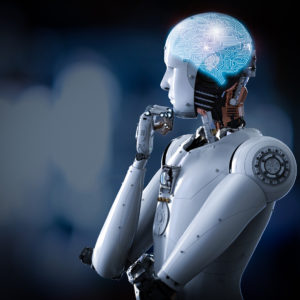Artificial intelligence (AI) and advanced robotics are no longer relegated to the scary technologies seen in old “Terminator” movies. They’re already here, and in the real world we need not be suspicious of them. Contrary to the criticisms and fears of technology skeptics, these technologies aren’t “taking over our lives,” but instead are helping solve real problems and improve our everyday lives.
From traffic apps that tell us the best way to get to work based on current conditions, to fraud alerts from our banks about suspicious activity, to Siri or Alexa answering our questions, most of us already interact with some form of AI on a daily basis. AI is used in predictive technologies by companies like Amazon and Netflix to generate recommendations that help us find new artists or topics that we might not otherwise find, opening new doors to the amazing abundance of options at our disposal.
And AI doesn’t just make things more convenient and enjoyable — it’s also empowering people and even saving lives. Machine learning in autonomous vehicles, for example, has the potential to save thousands of people lost to car accidents each year.
AI is used in medication monitoring, geolocation and mapping services, and personal home digital assistants that help some senior citizens to stay independent longer. Robots and AI help children with autism learn how to communicate and interact in social situations, by providing opportunities with social mediators when therapists and educators aren’t available.
Some critics of artificial intelligence, including Elon Musk and the late Stephen Hawking, argue that if we’re not careful, it will surpass and destroy us. However, as a 2017 Mercatus Center study notes, such concerns are nothing new and have been around for more than 50 years. These are largely based in science fiction and not fact.
This growing AI “technopanic” neglects to consider the ways in which we’ve already seamlessly adjusted to the AI we experience on a daily basis. If we let our fear of the worst-case scenarios dictate our actions and policies, then we never have a chance to create and enjoy the types of best-case scenarios that technology can bring about.
Some AI skeptics have called for a Federal Robotics Commission or new AI laws and regulatory bureaucracies. While these proposals are well-intentioned, we need to be especially careful not to cut ourselves off inadvertently from the future benefits of new technology.
First, as we’ve already seen from the wide variety of its use, it’s hard to clearly define what should be considered AI. As a result, it would be difficult to come up with a specific legal definition of what a new agency, law or regulation would apply to. For example, would both a credit card fraud alert and a security robot be regulated by the same law or agency?
Second, any regulation that is too burdensome will inevitably slow the pace of these life-improving and even life-saving technologies. It takes almost 18 months for new medical devices to get pre-market approval by the FDA. If it took a similar time period for new AI technology to gain approval, then a great deal of our favorite apps and virtual assistants might never be developed in an industry where getting to market quickly can make the difference between success or failure.
America’s current environment of “permissionless innovation” has encouraged rapid prototyping, competition and improvement in the field of AI — allowing innovators to provide solutions for problems we might not have even realized we had. No one requested that navigation apps update their maps to account for traffic, but most people enjoy being able to optimize their commute in real time.
We’ve only recently begun to tap the true potential of AI. It can adapt to new challenges rapidly, but can only be made transformative and safe through ongoing real-world experimentation. It may not be without risks, but neither are technologies operated through human intelligence, like our vehicles. Rather than taking over our lives, AI is slowly being integrating into our lives to make them better.

